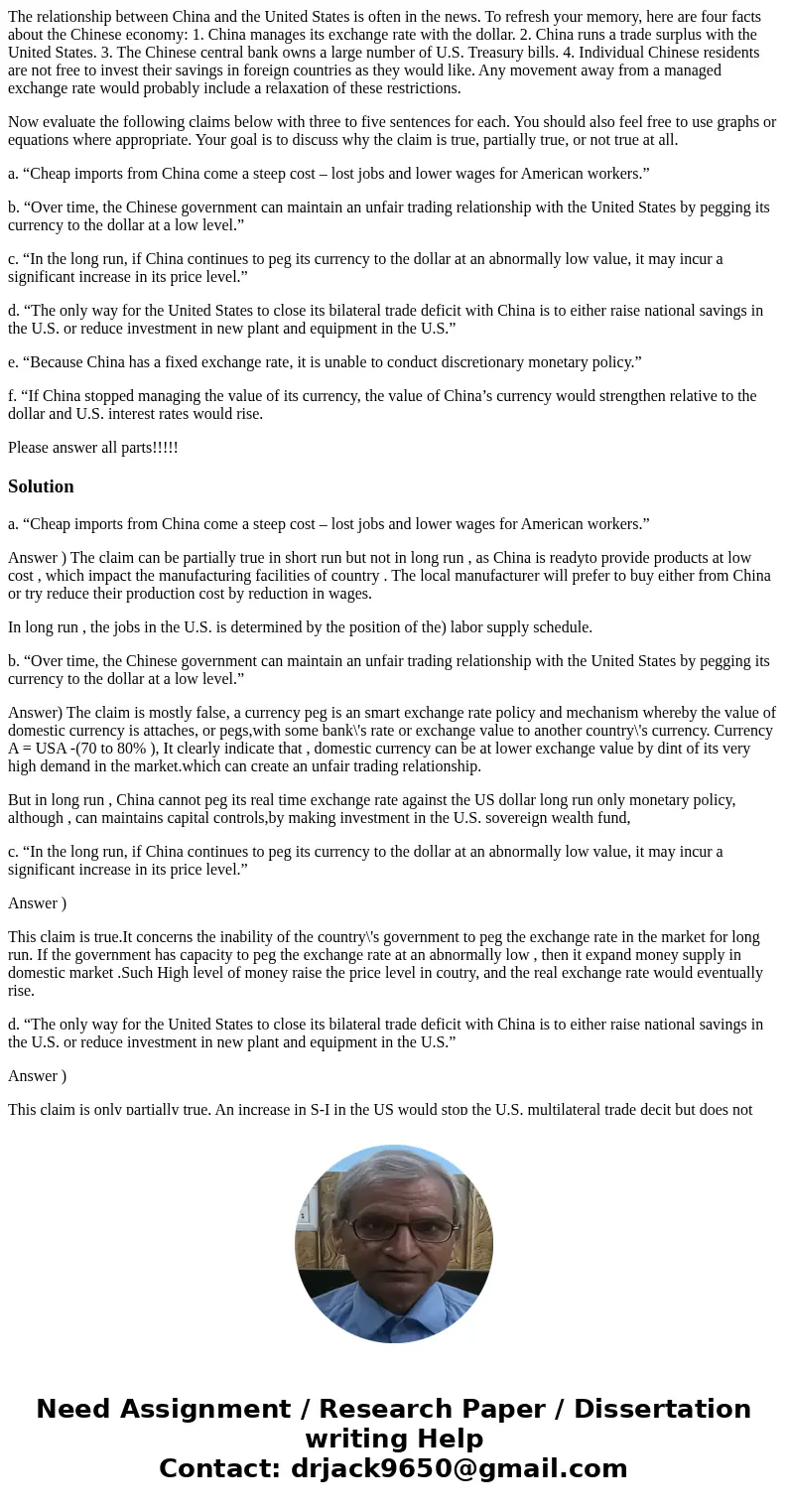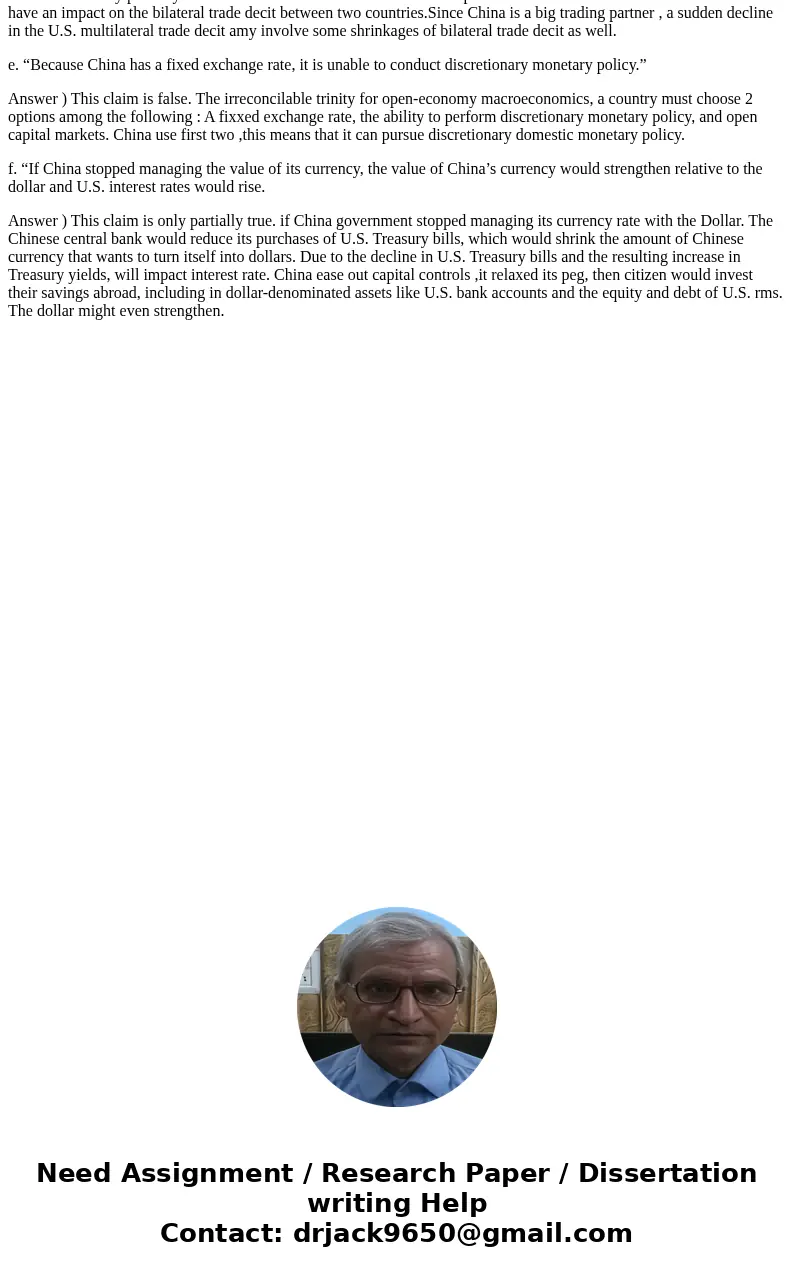The relationship between China and the United States is ofte
The relationship between China and the United States is often in the news. To refresh your memory, here are four facts about the Chinese economy: 1. China manages its exchange rate with the dollar. 2. China runs a trade surplus with the United States. 3. The Chinese central bank owns a large number of U.S. Treasury bills. 4. Individual Chinese residents are not free to invest their savings in foreign countries as they would like. Any movement away from a managed exchange rate would probably include a relaxation of these restrictions.
Now evaluate the following claims below with three to five sentences for each. You should also feel free to use graphs or equations where appropriate. Your goal is to discuss why the claim is true, partially true, or not true at all.
a. “Cheap imports from China come a steep cost – lost jobs and lower wages for American workers.”
b. “Over time, the Chinese government can maintain an unfair trading relationship with the United States by pegging its currency to the dollar at a low level.”
c. “In the long run, if China continues to peg its currency to the dollar at an abnormally low value, it may incur a significant increase in its price level.”
d. “The only way for the United States to close its bilateral trade deficit with China is to either raise national savings in the U.S. or reduce investment in new plant and equipment in the U.S.”
e. “Because China has a fixed exchange rate, it is unable to conduct discretionary monetary policy.”
f. “If China stopped managing the value of its currency, the value of China’s currency would strengthen relative to the dollar and U.S. interest rates would rise.
Please answer all parts!!!!!
Solution
a. “Cheap imports from China come a steep cost – lost jobs and lower wages for American workers.”
Answer ) The claim can be partially true in short run but not in long run , as China is readyto provide products at low cost , which impact the manufacturing facilities of country . The local manufacturer will prefer to buy either from China or try reduce their production cost by reduction in wages.
In long run , the jobs in the U.S. is determined by the position of the) labor supply schedule.
b. “Over time, the Chinese government can maintain an unfair trading relationship with the United States by pegging its currency to the dollar at a low level.”
Answer) The claim is mostly false, a currency peg is an smart exchange rate policy and mechanism whereby the value of domestic currency is attaches, or pegs,with some bank\'s rate or exchange value to another country\'s currency. Currency A = USA -(70 to 80% ), It clearly indicate that , domestic currency can be at lower exchange value by dint of its very high demand in the market.which can create an unfair trading relationship.
But in long run , China cannot peg its real time exchange rate against the US dollar long run only monetary policy, although , can maintains capital controls,by making investment in the U.S. sovereign wealth fund,
c. “In the long run, if China continues to peg its currency to the dollar at an abnormally low value, it may incur a significant increase in its price level.”
Answer )
This claim is true.It concerns the inability of the country\'s government to peg the exchange rate in the market for long run. If the government has capacity to peg the exchange rate at an abnormally low , then it expand money supply in domestic market .Such High level of money raise the price level in coutry, and the real exchange rate would eventually rise.
d. “The only way for the United States to close its bilateral trade deficit with China is to either raise national savings in the U.S. or reduce investment in new plant and equipment in the U.S.”
Answer )
This claim is only partially true. An increase in S-I in the US would stop the U.S. multilateral trade decit but does not have an impact on the bilateral trade decit between two countries.Since China is a big trading partner , a sudden decline in the U.S. multilateral trade decit amy involve some shrinkages of bilateral trade decit as well.
e. “Because China has a fixed exchange rate, it is unable to conduct discretionary monetary policy.”
Answer ) This claim is false. The irreconcilable trinity for open-economy macroeconomics, a country must choose 2 options among the following : A fixxed exchange rate, the ability to perform discretionary monetary policy, and open capital markets. China use first two ,this means that it can pursue discretionary domestic monetary policy.
f. “If China stopped managing the value of its currency, the value of China’s currency would strengthen relative to the dollar and U.S. interest rates would rise.
Answer ) This claim is only partially true. if China government stopped managing its currency rate with the Dollar. The Chinese central bank would reduce its purchases of U.S. Treasury bills, which would shrink the amount of Chinese currency that wants to turn itself into dollars. Due to the decline in U.S. Treasury bills and the resulting increase in Treasury yields, will impact interest rate. China ease out capital controls ,it relaxed its peg, then citizen would invest their savings abroad, including in dollar-denominated assets like U.S. bank accounts and the equity and debt of U.S. rms. The dollar might even strengthen.


 Homework Sourse
Homework Sourse